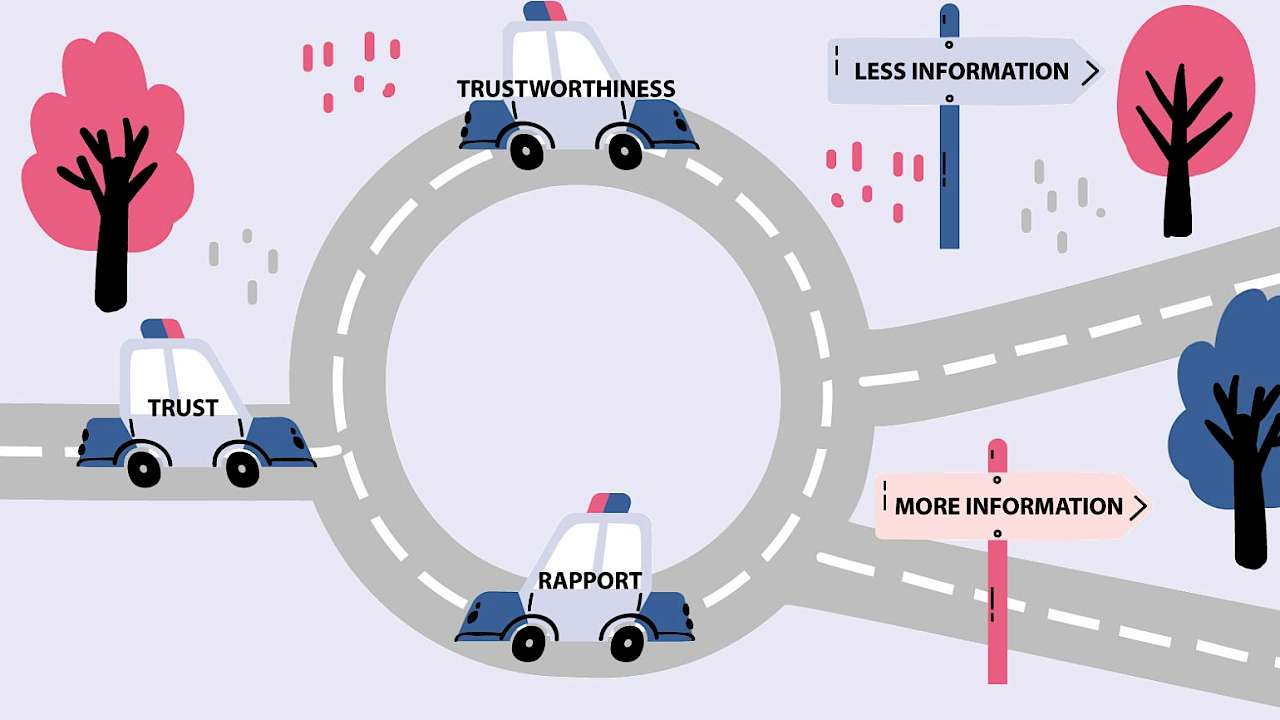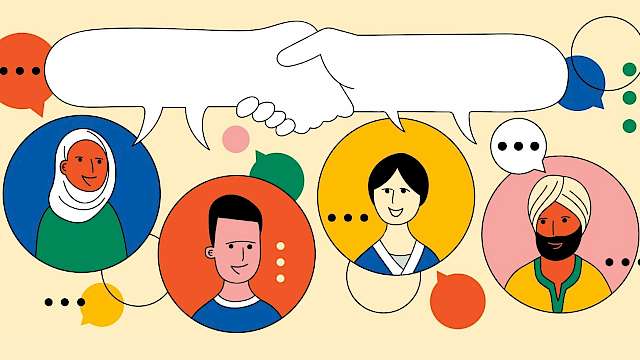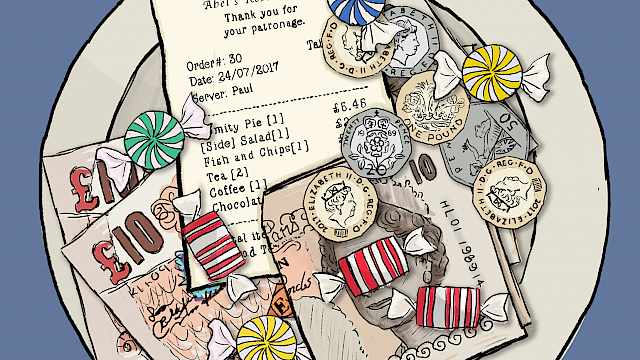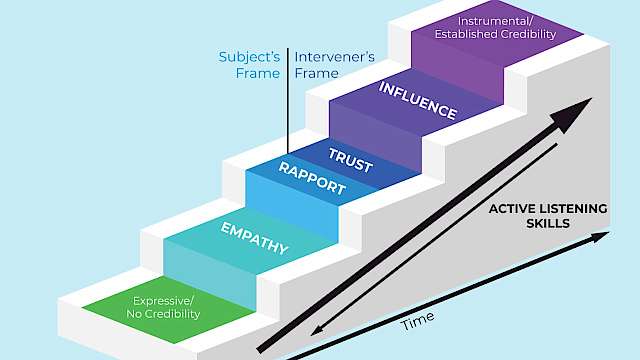Effective communication plays a crucial role in human interactions, with its significance particularly pronounced in law enforcement and security contexts. Lapses in communication, miscommunications, or errors in interactions with officers, source handlers or other security personnel can have profound and lasting repercussions for investigations and the efficacy of intelligence gathering. For this reason, effective interactions between interviewers and interviewees are crucial, irrespective of whether the interviewee is a suspect, witness, victim or source. To enhance statement quality and boost reliability, evidence-based interviewing models advocate a rapport-based approach. More recently, scholars have turned their attention to understanding the role of trust in information gathering contexts.
The role of trustworthiness and trust in information gathering
During encounters, we continuously evaluate an individual’s trustworthiness based on their competence (capability to perform a task), integrity (commitment to promises), and benevolence (demonstrated goodwill) (1). Our assessment of another person’s trustworthiness influences our willingness to trust them and, consequently, shapes our engagement in risk-taking behaviours (2). In intelligence gathering, instances of risk-taking may involve disclosing sensitive information that jeopardises the safety of the source, or sharing information that could be used to incriminate another individual. Now researchers have begun to explore how trustworthiness and trust impact investigative interviews and intelligence gathering efforts.
Trustworthiness and rapport emerge as pivotal factors in information-gathering efforts.
Drawing from case studies of real-life investigators, two trust-building strategies have been observed and studied: demonstrating trustworthiness and showing a willingness to trust (3). Under experimental conditions, trustworthiness (i.e., integrity) was demonstrated through an interviewer making and fulfilling a promise (e.g., promising to retrieve the mock-source’s phone), while the willingness to trust involved the interviewer demonstrating vulnerability to the mock-source (e.g., by trusting them with a key to a restroom near high-value equipment). Results suggest that interviewers who demonstrated their trustworthiness increased the mock-source’s trust, which enhanced cooperation and led to greater disclosure of relevant information. In contrast, the interviewer's demonstration of vulnerability to the source had no impact on how much trust the source had in the interviewer. It seems likely that the success of this trust-building strategy is conditional upon the pertinence of the offer (e.g., needing to go to the restroom). To advance our understanding of how to quickly build trust, future research should investigate the relative importance of competence, integrity, or benevolence in the trust-building process.
The effects of rapport-building on information gain
In contrast to trust, rapport and its impact on outcomes in information gathering has been extensively studied. Rapport can be defined as the quality of the interaction between the interviewer and the interviewee (4). The popular tripartite model of rapport (5) posits that this quality can be characterised by the extent to which both parties exhibit attentiveness (mutual attention), maintain a friendly and respectful demeanour (positivity), and smoothly transition between topics (coordination). Interviewers who successfully build and maintain rapport are perceived more positively and tend to elicit higher amounts of accurate information than interviewers who neglect rapport-building efforts. Building rapport with an interviewee appears to increase willingness to cooperate, and, as a result, increases the amount of information shared. It is, therefore, unsurprising that rapport-building seems to mitigate counter-interrogation tactics (CITs), such as passivity or providing a ‘no comment’ response. (6)
Numerous rapport-building strategies exist, and several have been subject to empirical investigation. In a recent study (7), the impact of reciprocal self-disclosure on the extent of crime-relevant information shared by participants was examined. The findings suggest when interviewers and participants sought and discussed commonalities, it created a sense of connection (i.e., rapport), which in turn, improved cooperation and made participants share more relevant information when questioned. Similar to trust-building, rapport-building appears to indirectly boost information disclosure by facilitating interviewees’ willingness to cooperate.
The intersection of rapport and trust
While trust and rapport seem to operate in a similar fashion, their interaction might lead to different interview outcomes. Consider this scenario: you encounter an interviewer you initially perceive as untrustworthy. However, during the following interview, they adopt an overly friendly approach in an attempt to build rapport. According to theories on expectancy violations, this rapport-building effort could backfire and heighten your suspicions. The incongruence between the interviewer’s friendliness and your initial perception may exacerbate your concerns about their trustworthiness. Conversely, some research suggests that beliefs are adaptable. Adopting this perspective, you might reinterpret their rapport-building as friendly, correcting your initial perception and arriving at a more neutral standpoint.
To test these contrasting predictions, our recent research manipulated the interviewer’s trustworthiness (untrustworthy vs trustworthy) and rapport-building attempts (present vs absent) and investigated the impact on disclosure of sensitive information in a simulated job interview conducted through a chat interface (8). Findings revealed a decrease in the participants’ trust in the interviewer when they perceived them as untrustworthy, consequently reducing the amount of sensitive information disclosed during the interview. Interestingly, no significant effects of rapport on interview disclosure were observed, and there was no discernible interaction between rapport-building and perceived trustworthiness. That means, contrary to predictions, interviewers who build rapport did not elicit more information from participants than interviewers who refrained from rapport-building. Given the professional context of a job interview, participants’ might not have expected the interviewer to be overly friendly, and, in turn, might not have judged the lack of rapport harshly. Ongoing research is exploring the interplay between trustworthiness and rapport in security vetting interviews, aiming to re-examine these dynamics within a context where rapport is of heightened significance.
In conclusion, trustworthiness and rapport emerge as pivotal factors in information-gathering efforts, exerting an indirect impact on information disclosure by shaping interviewees’ willingness to trust and cooperate with the interviewer. While trustworthiness and trust have been overlooked in previous research, emerging evidence seems to suggest that they exert considerable influence on the quantity of information elicited. The nuanced interplay of trust and rapport remains subject to further exploration. For now, we advise practitioners to be aware of the impact their trustworthiness may have on information gathering outcomes and recognise that negative perceptions may not be adequately addressed solely through rapport-building efforts. Rather than attempting to address negative perceptions through subsequent actions, practitioners may pre-emptively avert such perceptions by actively demonstrating their trustworthiness early in interactions. However, further research is needed to determine the most effective approaches for enhancing perceptions of trustworthiness.
Read more
- Mayer, R. C., Davis, J. H., & Schoorman, F. D. (1995). An integrative model of organizational trust. Academy of management review, 20(3), 709-734. https://doi.org/10.5465/amr.1995.9508080335
- Colquitt, J. A., Scott, B. A., & LePine, J. A. (2007). Trust, trustworthiness, and trust propensity: A meta-analytic test of their unique relationships with risk taking and job performance. Journal of Applied Psychology, 92(4), 909–927. https://doi.org/10.1037/0021-9010.92.4.909
- Oleszkiewicz, S., Atkinson, D. J., Kleinman, S., & Meissner, C. A. (2023). Building Trust to Enhance Elicitation. International Journal of Intelligence and CounterIntelligence, 1-22.https://doi.org/10.1080/08850607.2023.2255507
- Neequaye, D. A., & Mac Giolla, E. (2022). The use of the term rapport in the investigative interviewing literature: A critical examination of definitions. Meta-Psychology, 6. https://doi.org/10.15626/MP.2021.2808
- Tickle-Degnen, L., & Rosenthal, R. (1990). The nature of rapport and its nonverbal correlates. Psychological inquiry, 1(4), 285-293. https://doi.org/10.1207/s15327965pli0104_1
- Alison, L., Alison, E., Noone, G., Elntib, S., Waring, S., & Christiansen, P. (2014). The efficacy of rapport-based techniques for minimizing counter-interrogation tactics amongst a field sample of terrorists. Psychology, Public Policy, and Law, 20(4), 421–430. https://doi.org/10.1037/law0000021
- Dianiska, R. E., Swanner, J. K., Brimbal, L., & Meissner, C. A. (2021). Using disclosure, common ground, and verification to build rapport and elicit information. Psychology, Public Policy, and Law, 27(3), 341–353. https://doi.org/10.1037/law0000313
- Hillner, L., Hope, L., Kontogianni, F., & Conchie, S. (2023, July 11-13). The role of trustworthiness and rapport in computer-mediated information elicitation [Conference session]. Behavioural and Social Science in Security (BASS23) conference. Bath, United Kingdom.
Copyright Information
As part of CREST’s commitment to open access research, this text is available under a Creative Commons BY-NC-SA 4.0 licence. Please refer to our Copyright page for full details.
IMAGE CREDITS: Copyright ©2024 R. Stevens / CREST (CC BY-SA 4.0)







